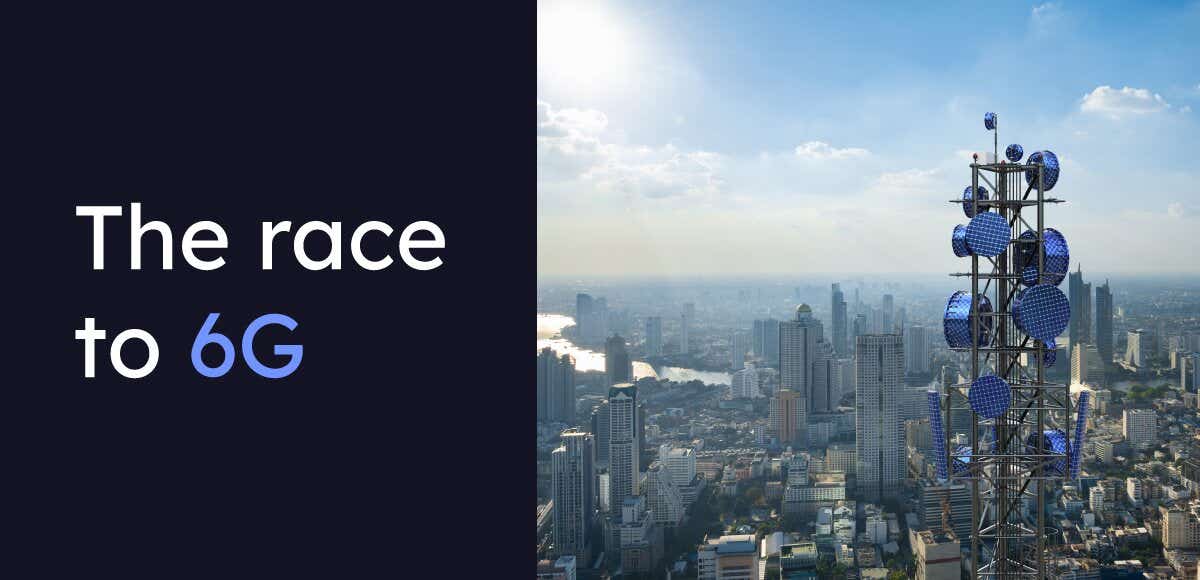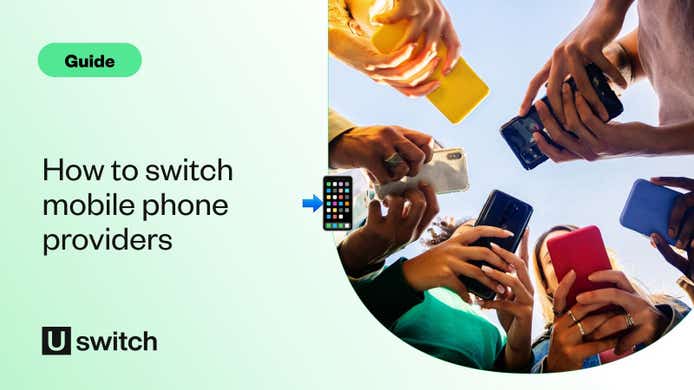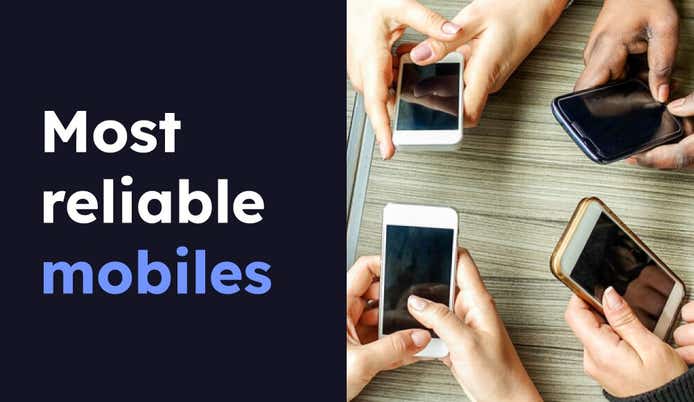Implementing 6G technology is about more than downloading content faster. It can be used for virtual and augmented reality, self-driving vehicles, artificial intelligence, and remote surgery, to name just a few applications. 6G will be essential for emerging technologies in the coming decade.
It's likely that 6G technology will lead to changes in the way we use our mobile phones too. If 6G delivers on its promised lightning-fast speeds, it will make 5G speeds feel old and outdated. Consequently, network providers are likely to roll out 6G, meaning mobile phone deals will be able to connect you to networks running at speeds a thousand times faster than most home internet networks today.
Even though 5G is quite well known today, many cell phone companies haven’t even met 4G benchmarks yet. Many networks have introduced 4G LTE or long-term evolution. The term sounds promising, but it’s actually slower than the original 4G.
The implementation of 6G isn’t expected until at least 2030. So, in the meantime, you might want to invest in a new mobile phone plan with greater 5G coverage. If you are in the market for a new mobile phone, make sure to compare mobile phone contracts first.
By analysing data across various factors, from 5G speeds to mobile broadband demand, this report reveals which countries and companies are leading the race to 6G.
Which countries are leading the race to 6G?
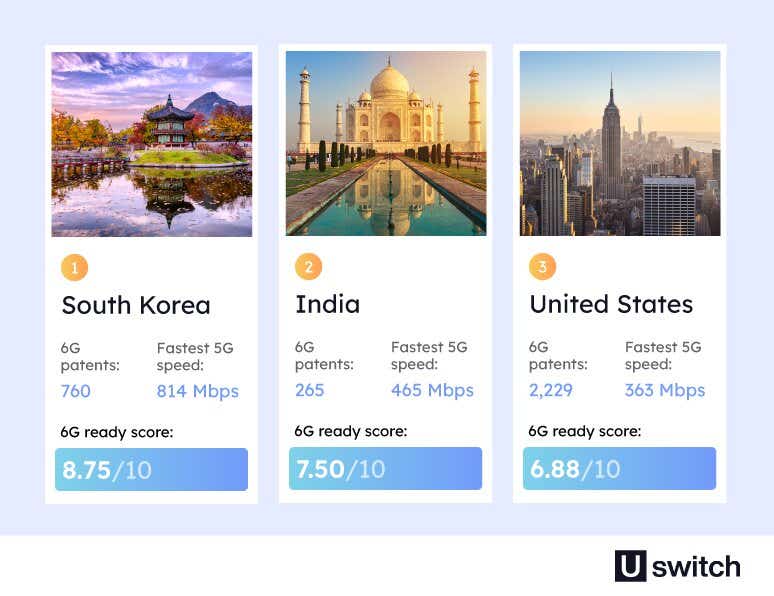
Patents for 6G technology have soared in recent years, with several countries leading the way in terms of research and development. 6G will require advanced hardware, software, and infrastructure to achieve its full potential.
The research and development of 5G technology and the implementation of effective 5G networks, will also contribute to the development of 6G by informing best practices and nurturing expertise in the field. Mobile networks may be able to build on previous 5G networks to quicken the transition process and get your phone connected to 6G faster.
1. South Korea - 8.75/10
South Korea boasts 760 6G patents as of the end of 2022. The country also recorded an 814.2 Mbps average speed for its top 10% of 5G connections, this is the highest recorded speed on our list. The significant investment in 6G research, paired with the effective development of 5G, positions South Korea as the leader in the race to 6G.
South Korea was a pioneer in 5G technology, investing heavily in fibre optics and 5G networks. The country is known for its highly connected and digital society and many see its internet infrastructure as a model for others to follow. South Koreans have a high rate of internet usage with many relying on digital services for shopping, banking, and everything in between.
2. India - 7.50/10
India has filed 265 patents for 6G technology and has recorded a substantial 465 Mbps average speed in its top 10% of connections. With a comprehensive 5G infrastructure and good advancement in 6G research, India is also one to watch in the race to 6G.
India is one of the world's largest and fastest-growing internet markets. Over recent years, the country has experienced rapidly expanding digital ecosystems that are changing the way we live, work, and communicate. By the end of 2022, India recorded over 900 million active internet users, second only to China as the largest online market in the world.
3. United States - 6.88/10
The US has reported the second-highest volume of patent files in the world, with 2,229 at the end of 2022. The fastest 10% of connections in the US score a respectable average of 362.9 Mbps, making the US another likely leader in the race to 6G.
The US has long been a leader in the development of broadband and high-speed internet technologies. Americans have widespread access to fibre-optic networks, cable internet, and mobile networks. As of 2022, 92% of the US population actively uses the Internet and relies on internet connections for entertainment, commerce, and education.
| Rank | Country | 6G Patents | Fastest 5G Speed | 6G Ready Score |
|---|---|---|---|---|
| 1 | South Korea | 760 | 814 | 8.75 |
| 2 | India | 265 | 465 | 7.5 |
| 3 | United States | 2,229 | 363 | 6.88 |
| 4 | China | 4,604 | 142 | 5 |
| 4 | United Kingdom | 115 | 392 | 5 |
| 6 | Japan | 155 | 298 | 3.75 |
| 6 | Finland | 12 | 452 | 3.75 |
| 8 | Germany | 77 | 330 | 3.13 |
| 9 | Australia | 55 | 296 | 1.25 |
Which companies are investing the most in 6G developments?
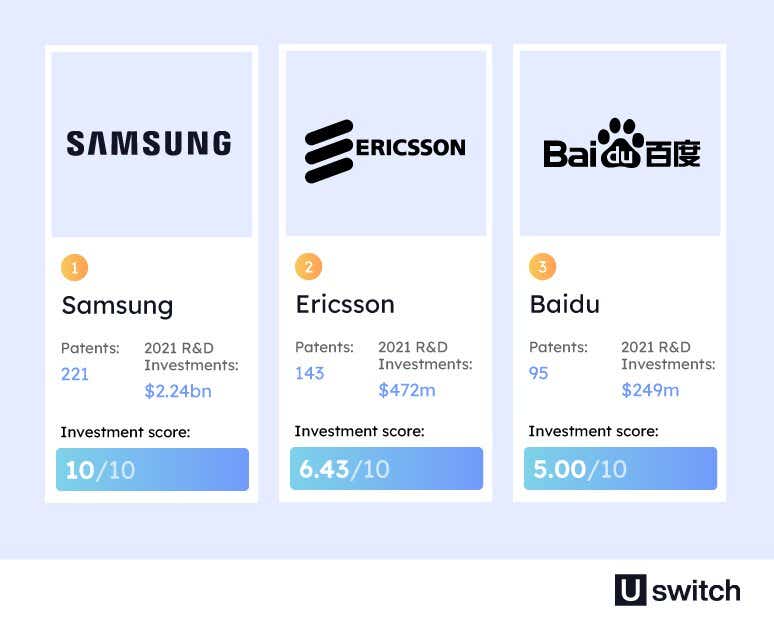
Governments and universities aren’t the only ones taking steps to invest in research and development (R&D) to advance 6G technology. There are also a number of tech-based companies working on developing the technology, standards and protocols to enable 6G to operate at greater speeds than 5G.
1. Samsung - 10/10
Samsung invested an astronomical $2.24 billion in research and development over the course of 2021, the largest on our list of 6G developers. While we can’t say how much of this investment went directly towards 6G technology, Samsung has recorded an impressive 221 6G-related patents, more than the entirety of Japan.
In May 2022, Samsung released a white paper outlining its vision for 6G. Samsung stated they are “committed to taking the lead and sharing our findings to spread our vision to bring the next hyper-connected experience to every corner of life”. In October 2022, Samsung announced a new 6G research group based in the UK whose goal is to develop a range of new 6G technologies for deployment around 2030.
2. Ericsson - 6.43/10
Ericsson has filed for 143 patents as of 2022, more than the United Kingdom has. Over 2021, Ericsson invested $472 million in research and development, with a likely proportion of this going towards 6G technology. The company predicts 6G will become available early in the 2030s.
Ericsson declares the brand envisions a “connected and sustainable physical world that is both digitalized and programmable, where humans are supported by intelligent machines and the Internet of Senses”. The company outlines several major applications of 6G technology, including e-health, precision health care, smart agriculture, earth monitor, digital twins, cobots and robot navigation.
3. Baidu - 5/10
Baidu invested $249 million into its research and development in 2021. By the end of 2022, the company has filed a total of 95 6 G-related patents, demonstrating they are invested in developing the technology.
6G will be expected to require tremendous computing capabilities. It will be necessary to introduce new technologies, such as quantum computing, to overcome processing demands. Baidu has already developed a quantum computer, dubbed “Qianshi”, which was revealed in Beijing on August 25, 2022. The computer has a 10-quantum-bit (qubit) processor and adds Baidu to the global race to 6G.
| Rank | Company | Patents | 2021 R&D Investments | Investment Score |
|---|---|---|---|---|
| 1 | Samsung | 221 | $2.24bn | 10 |
| 2 | Ericsson | 143 | $472m | 6.43 |
| 3 | Baidu | 95 | $249m | 5 |
| 4 | Intel | 188 | $175m | 6.43 |
| 5 | Qualcomm | 146 | $82m | 5 |
| 6 | IBM | 192 | $66m | 5.72 |
| 7 | Nokia | 87 | $46m | 1.43 |
Where has the fastest 5G internet speeds by country?
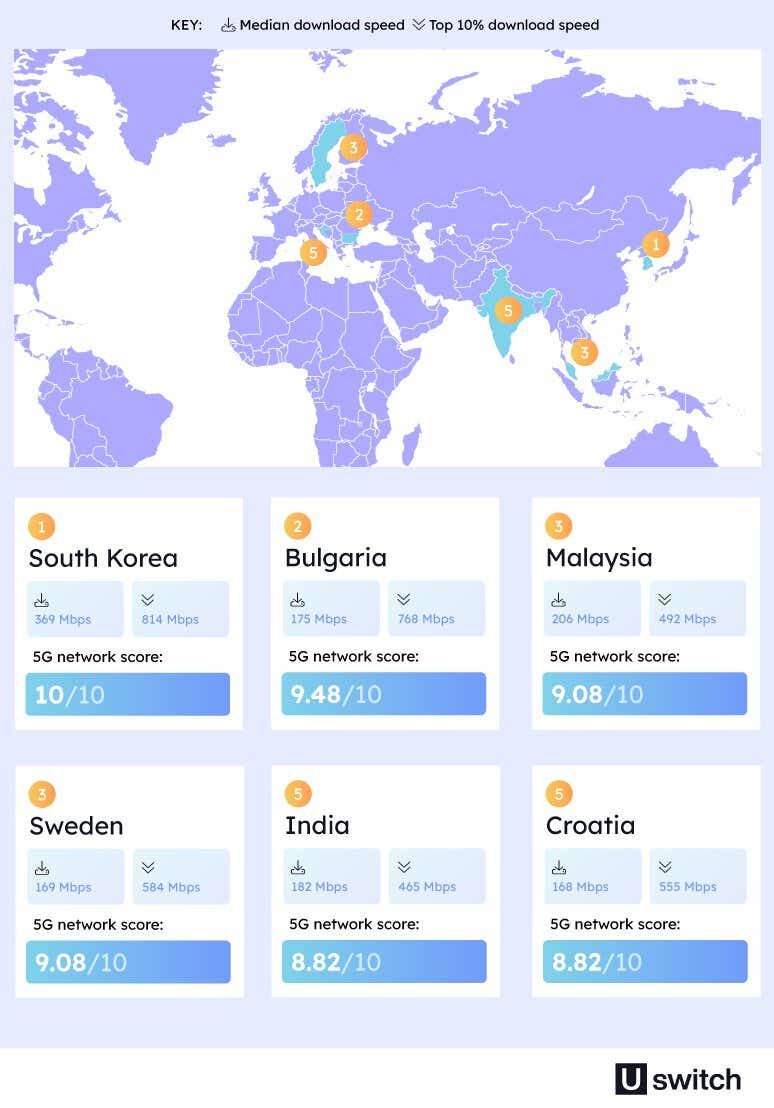
We’ve also investigated where in the world you can currently find the fastest mobile internet speeds by country. It’s likely these countries will also find it easier to implement 6G technology by building on their operational 5G networks.
Many mobile network providers are still operating on 4G technology. For those of us who use our mobiles regularly and consume large amounts of data, we want the best and fastest mobile internet speeds available.
To put the following figures into perspective, a download speed of 100 Mbps would be more than enough for a household of 4 to enjoy a seamless internet experience. Some experts estimate that 6G technology will be capable of speeds of 1 Tbps (1,000,000 Mbps).
1. South Korea - 10/10
South Korea tops the leaderboards on both median and top download speeds. South Korea has recorded a massive download speed of 814 Mbps in the top 10% of users. This speed is incredibly fast and would provide any user with an unparalleled internet experience.
2. Bulgaria - 9.48/10
Bulgaria offers a super high speed of 768 Mbps in its top 10% of users, positioning the country in second position for the fastest 5G network.
3. Malaysia - 9.08/10
Malaysia ranks as the joint third-fastest 5G provider alongside Sweden. Malaysia offers an impressive median speed of 206 Mbps.
3. Sweden - 9.08/10
Sweden, joint third with Malaysia, offers a whopping 584 Mbps speed in the top 10% of its 5G network, with an excellent median speed of 169 Mbps.
| Rank | Country | Median - Download speed (Mbps) | Top 10% -Download speed (Mbps) | 5G Network Score |
|---|---|---|---|---|
| 1 | South Korea | 369 | 814 | 10 |
| 2 | Bulgaria | 175 | 768 | 9.48 |
| 3 | Malaysia | 206 | 492 | 9.08 |
| 3 | Sweden | 169 | 584 | 9.08 |
| 5 | India | 182 | 465 | 8.82 |
| 5 | Croatia | 168 | 555 | 8.82 |
| 7 | Denmark | 167 | 538 | 8.55 |
| 8 | Brazil | 143 | 587 | 8.55 |
| 9 | Finland | 141 | 452 | 7.5 |
| 10 | Kuwait | 165 | 406 | 7.37 |
| 11 | Taiwan | 145 | 437 | 7.37 |
| 12 | Saudi Arabia | 131 | 439 | 7.11 |
| 13 | Singapore | 90 | 444 | 6.58 |
| 14 | Portugal | 75 | 457 | 6.45 |
| 15 | France | 90 | 400 | 6.19 |
| 16 | United Kingdom | 84 | 392 | 5.79 |
| 17 | Austria | 99 | 294 | 5 |
| 18 | Germany | 78 | 330 | 4.74 |
| 19 | Mexico | 72 | 331 | 4.61 |
| 20 | Switzerland | 63 | 382 | 4.48 |
Where has the fastest 5G internet speeds by UK city?
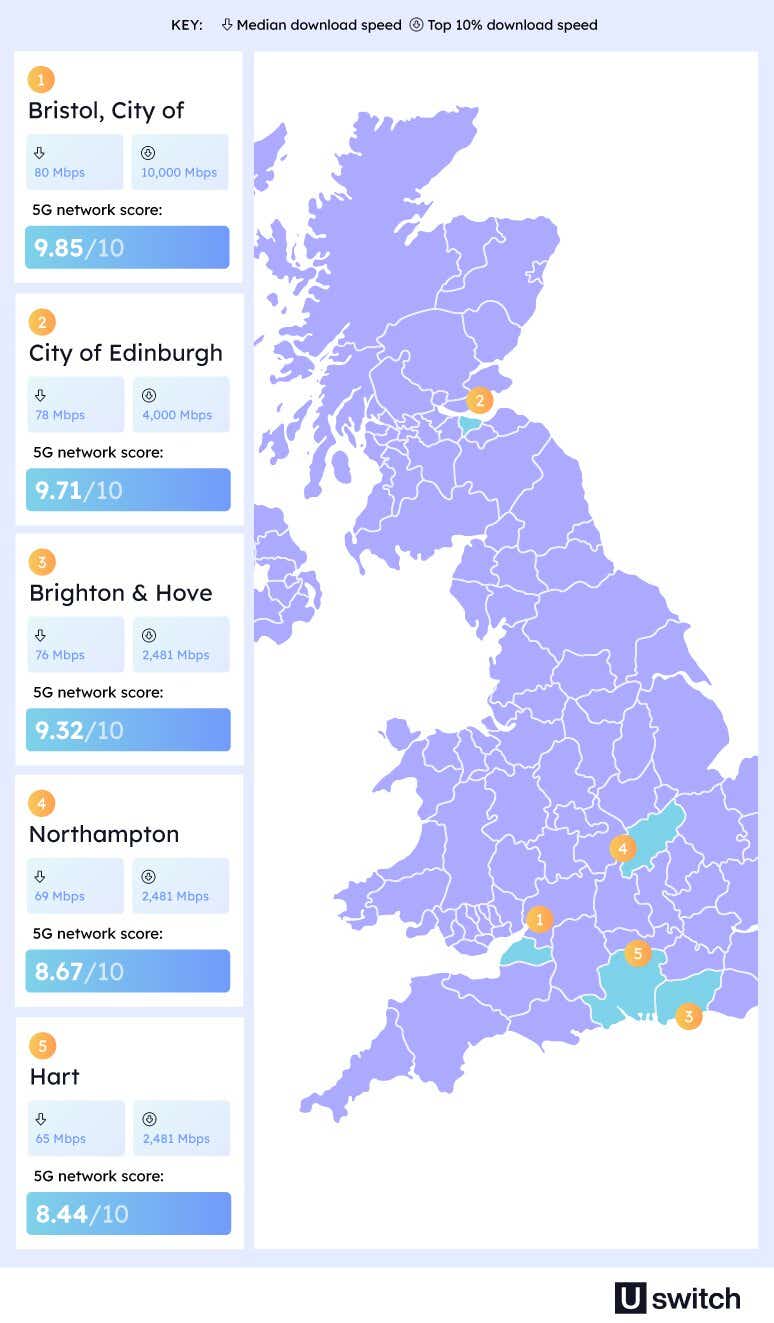
The UK's fastest download speeds are typically found in built-up urban areas where internet infrastructure is more developed. We’ve revealed the areas with the fastest 5G network speeds below to predict where in the UK will offer the greatest 6G speeds in the future.
1. Bristol, City of - 9.85/10
Bristol has been revealed as the UK area with the greatest 5G networks, offering a huge 10,000 Mbps maximum download speed. Pair this with a median download speed of 80 Mbps, Bristol offers the fastest overall 5G connection in the UK.
2. City of Edinburgh - 9.71/10
Edinburgh’s maximum speed of 4,000 Mbps is less than half of Bristol’s but is still an impressive download speed. With a median speed of 78 Mbps, Edinburgh offers one of the fastest internet networks in the UK.
3. Brighton and Hove - 9.32/10
Brighton and Hove record a reliable median download speed of 76 Mbps alongside a super fast 2,481 Mbps maximum speed, ranking it in third place.
| Rank | Local Authority | Median - Download speed (Mbit/s) | Maximum - Download speed (Mbit/s | Network Score |
|---|---|---|---|---|
| 1 | Bristol, City Of | 80 | 10,000 | 9.85 |
| 2 | City Of Edinburgh | 78 | 4,000 | 9.71 |
| 3 | Brighton And Hove | 76 | 2,481 | 9.32 |
| 4 | Northampton | 69 | 2,481 | 8.67 |
| 5 | Hart | 65 | 2,481 | 8.44 |
| 6 | Birmingham | 74 | 1,124 | 8.4 |
| 7 | Telford And Wrekin | 67 | 2,364 | 8.39 |
| 8 | Dudley | 73 | 1,124 | 8.37 |
| 9 | Trafford | 64 | 2,481 | 8.36 |
| 10 | Falkirk | 73 | 1,124 | 8.33 |
| 11 | Stockport | 72 | 1,124 | 8.27 |
| 12 | Solihull | 72 | 1,124 | 8.25 |
| 13 | Wolverhampton | 72 | 1,124 | 8.2 |
| 14 | Reading | 71 | 1,124 | 8.16 |
| 15 | Tamworth | 70 | 1,124 | 8.12 |
| 16 | Surrey Heath | 70 | 1,124 | 8.04 |
| 17 | Burnley | 70 | 1,124 | 8 |
| 18 | Salford | 58 | 2,481 | 7.98 |
| 19 | Bournemouth, Christchurch And Poole | 60 | 2,364 | 7.96 |
| 20 | Redditch | 69 | 1,124 | 7.95 |
Frequently Asked Questions
What is 6G internet?
Sixth-generation wireless internet (6G) is the successor to 5G internet. 6G is expected to offer faster, more reliable connectivity and enable a range of new applications like virtual reality, autonomous vehicles and remote surgery. 6G is predicted to be capable of data transfer rates of up to 1 terabit per second (1Tbps).
What is mobile broadband?
Mobile broadband is wireless internet access that is provided through cellular networks. Mobile broadband providers usually offer deals that give users access to a certain amount of data allowance they can use to access the internet on the move. Mobile broadband can be accessed through a variety of wireless technologies, including 3G, 4G and 5G networks, each of which offers different levels of speed and reliability. 6G is expected to become the fastest version of wireless mobile broadband.
Which mobile network is best?
The best mobile network is the best one for you, depending on your circumstances. Each network offers different speeds, costs and coverage, which will vary from location to location. It's important to do your own research on the options available to see which one is best based on your own needs and preferences. You can check online reviews, coverage maps and pricing plans to help you make an informed decision.
Methodology and sources
The median and maximum 5G download speeds were recorded from Speedcheck.
Ofcom data was used to rank the regions of the UK on their internet coverage. Ofcom was also used to show each UK local authority's median and maximum speeds.
6G patent filings by country were recorded from Questel.
Internet demand ranking factors were sourced from the following:
The % of individuals using the internet was taken from the ITU
The number of fixed broadband subscriptions per 100 people was taken from the ITU
The number of mobile phone subscriptions per 100 people was taken from the ITU
Streaming service subscribers in each country were taken from Flixpatrol for Netflix, Amazon Prime and Disney +*,**.
The share of internet users who play video games on any device was taken from Statista.
Average monthly Google searches for “5G” and “6G” per 100,000 were recorded using Google Ads Keyword Planner.
*Russia and China were excluded from these lists due to these services not operating in these countries.
**Data for these factors will only include those countries listed on the Statista video games source, which represents a global survey of major countries.
Research and development expenses were measured as the total R&D expenses for the full year of 2022 from Trading212.


